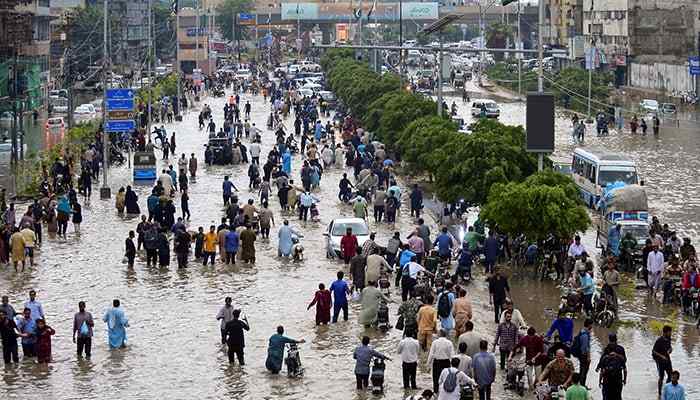KARACHI – Life in Pakistan’s largest city has been thrown into chaos as prolonged power outages and waterlogging continued on Thursday, more than 48 hours after heavy monsoon rains battered Karachi and parts of Sindh.
Large sections of the metropolis remain without electricity, while flooded roads have choked mobility. Authorities now warn that the next phase of monsoon rains could bring even worse conditions.
City Still Drenched, Roads Cut Off
Though the Clifton underpass has been cleared for vehicles, most other underpasses remain closed, Karachi’s traffic police said. Korangi River and Causeway Road were also declared unsafe for traffic.
Neighborhoods Endure Days Without Power
Residents across Karachi – from North Nazimabad and Gulistan-e-Jauhar to Defence View, Orangi, Lyari, Baldia, Liaquatabad, Surjani and the Korangi Industrial Area – reported blackouts lasting anywhere between 24 to 48 hours. In some localities, power had not returned even after 36 hours, cutting off water supplies as well.
In Gulistan-e-Jauhar, angry residents blocked roads after going without power for more than 32 hours. Some parts of North Nazimabad recorded outages stretching to nearly two full days.
The situation was no better in Hyderabad, where locals claimed nearly 90% of Latifabad and Qasimabad were still in darkness.
K-Electric Says “94% Restored”
K-Electric, the city’s sole power supplier, defended its performance. CEO Moonis Alvi said more than 500 feeders tripped during the storm, but claimed supply to 94% of Karachi had been restored by Wednesday evening.
The company maintained that only about 100 feeders remained offline, blaming waterlogging for preventing field teams from reaching affected areas.
Governor Steps In Amid Rising Public Anger
Sindh Governor Kamran Khan Tessori visited rain-hit neighborhoods with MQM leader Farooq Sattar late Wednesday. He admitted that outages had become Karachi’s most pressing crisis, noting that in Surjani, families were forced to spend nights on rooftops as floodwater entered their homes.
According to Tessori, the Governor House complaints cell received over 11,000 calls in a single day – most related to electricity. Similar centers will now be set up in Hyderabad and Mirpurkhas.
“This is not just about climate change,” Tessori remarked. “Once this emergency ends, the structural reasons for these failures must be fixed.” He confirmed that K-Electric’s top management had been summoned for explanations.
Tragedy Strikes: Brothers Electrocuted
The rains also turned deadly. Two brothers – Murad, 21, and Siraj, 16 – were electrocuted in Natha Khan Goth during Tuesday’s storm. Their father has filed a case at Shah Faisal Colony police station, which now includes manslaughter charges against K-Electric officials.
Experts Warn of Worse to Come
Federal Climate Change Minister Dr. Musadik Malik cautioned that the current wet spell is expected to last until September 10, with the next monsoon system forecast to be stronger. Speaking on a talk show, he warned that sudden cloudbursts and flash floods can sweep away massive rocks “like straws,” putting hotels and homes in flood-prone zones at serious risk.
Sindh Local Government Minister Nasir Hussain Shah admitted Karachi’s drainage network can handle only 40mm of rain, making it incapable of coping with the 200mm recently recorded.
Environmental experts echoed concerns, pointing out that unchecked stone-crushing in mountain regions has worsened flood risks by destabilizing natural barriers.
Outlook
With residents still reeling from outages and flooding, the coming weeks look precarious. Officials say preparations must accelerate before the next monsoon surge arrives — or Karachi could face an even deeper humanitarian crisis.
